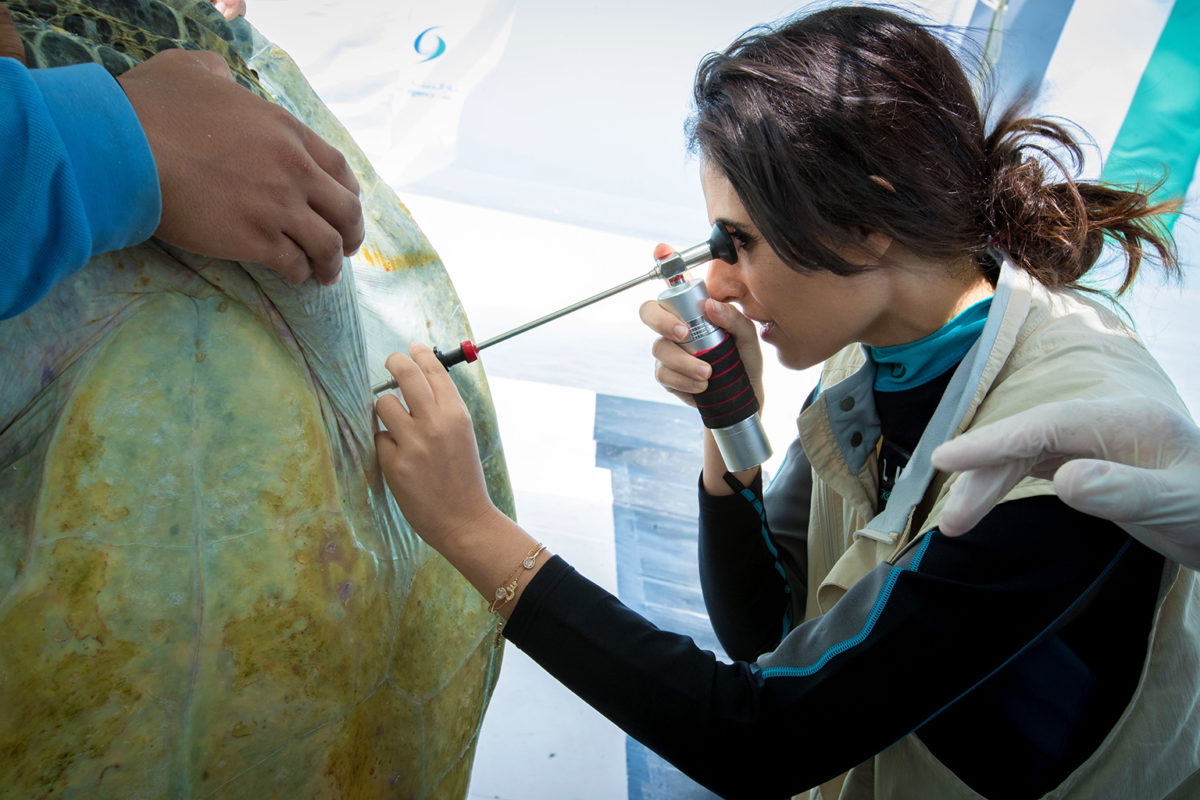Few people likely associate the United Arab Emirates, a federation of seven mostly oil-rich emirates on the Western shores of the Persian Gulf and the Gulf of Oman, with biodiversity conservation. But the next president of one of the world’s most prominent conservation groups, the International Union for Conservation of Nature (IUCN), could be from the UAE.
Razan Khalifa Al Mubarak is in the running to become the first woman from the Arab world to head IUCN. Ms. Al Mubarak is up against two other candidates — Malik Khan from Pakistan and John Robinson from the United States — in the election, which will take place during IUCN’s World Conservation Congress, which starts this week.
Having served as the managing director of three prominent institutions — the Environment Agency Abu Dhabi (EAD), a government agency; the Mohamed bin Zayed Species Conservation Fund, the philanthropy funded by the crown prince of Abu Dhabi; and Emirates Nature, an NGO affiliated with the World Wildlife Fund (WWF) — Ms. Al Mubarak would bring unique experience to the helm 73-year-old conservation organization.
Ms. Al Mubarak has distinguished herself in these roles. In her capacity as managing director of EAD, she persuaded Abu Dhabi to double its protected areas targets and adopt a goal of reducing the state’s greenhouse gas emissions 42% by 2030. At the Mohamed bin Zayed Species Conservation Fund — which she has managed since its 2008 founding — Ms. Al Mubarak has overseen grants distributed to more than 2,250 conservation projects in over 180 countries. At Emirates Nature, she has helped lead efforts to protect reefs, wilderness, and sea turtles in the UAE.

Along the way Ms. Al Mubarak has been an advocate for improving inclusivity in conservation, providing resources to communities that have often been marginalized in the sector, including Indigenous peoples and women.
“The only way to solve a multidimensional problem like biodiversity loss is to ensure that all stakeholders have a seat at the table – women, young people, and people from all geographies,” Ms. Al Mubarak told Mongabay during a recent interview. “For example, indigenous peoples make up five percent of the world’s population and they are protecting over 80 percent of Earth’s biodiversity. Their experience with resilience and how to live in balance with nature provide the world with invaluable insights on how to conserve biodiversity while adapting to climate change.”
“It is critical that women have an equal voice in decision-making when it comes to the sustainable use of land, water, and other natural resources,” she continued. “Women are not just lacking an equal seat at the table at a grassroots level. Like many fields dominated by men such as science, engineering, and government, women are also underrepresented in the conservation world.”
Ms. Al Mubarak said that a recent analysis of the Mohamed bin Zayed Species Conservation Fund’s grant applications found men submit three times more requests for funding than women. She also noted that only 30% of the members of the IUCN Species Survival Commission, which plays a critical role in driving the conservation agenda for individual species, are women.
“Our own response has been to make a concerted effort to solicit more applications from women,” she said. “Spotlighting the critical work of women conservationists will inspire more women to pursue a career in the field. At the same time, we need to encourage schools and universities to recruit and support women considering a conservation career.”

Ms. Al Mubarak told Mongabay she has four priorities if elected to the IUCN’s presidency.
The first of these includes doubling down on IUCN’s strengths: specifically, its “knowledge products like the Red List of Threatened Species and the Green List of Protected and Conserved Areas.”
“We need to embrace our unique selling points as a nature conservation institution and leverage the expertise of our employees, members, and volunteers,” she said.
The second is enhancing collaboration between different stakeholders to make conservation more relevant to more people.
“We need to better engage with business, government, civil society, and philanthropic communities and create effective collaborations across complex sectors of society,” said Ms. Al Mubarak.

The third, she noted, is consistency and good governance: “Good governance, when done right, will lead to greater efficiency, scaled-up impact, and enhanced trust.”
Fourth is communication.
“IUCN’s brand needs to be recognized and valued so that we can build trust and achieve our mission,” she said. “Good communication does not happen by default. It happens by design.”
Ms. Al Mubarak talked about these topics and much more during an August 2021 conversation with Mongabay.

